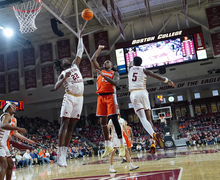Senior always knew Syracuse was right choice
June Pace never wanted her son to go so far away. The day Syracuse men’s basketball guard Josh Pace told her he’d chosen Syracuse, she cried. The pair had grown too close.
Her only son couldn’t leave.
But Pace did leave Griffin, Ga., with June’s blessing – under one condition. Once he made his decision, there’d be no looking back. He’d stay at Syracuse for four years, and you better believe he’d get his degree.
While it hasn’t always been easy for Pace, he’s delivered on his promise. He struggled through two years on the bench and transformed himself into arguably Syracuse’s most important player. He’ll earn his degree this May. June Pace is long past those initial tears.
‘I wanted him to prove to me he’d make his decision and be a man about it,’ June said. ‘Once he made his decision, he had to stick with it.’
Syracuse head coach Jim Boeheim vividly remembers his recruiting trip to Griffin. Former Syracuse assistant Troy Weaver discovered Pace on the AAU circuit. He liked what he saw and dispatched Boeheim down south.
Boeheim, convinced the Orange hit upon something special, prepared his best recruiting pitch. About a quarter of the way through, Pace stopped him.
‘Coach, I want to come to Syracuse,’ Pace told Boeheim.
That’s when June’s tears started flowing. Weaver convinced her that Pace would be looked after. June relented.
Sometime in that transition period, Pace lost his shot – or at least began to struggle with it. At Griffin High School, coach Ferris Qualls asked Pace to do just about everything. Shoot, drive, play defense.
In those days, Pace shot more often than anything else. Qualls and June both remember his deadly 3-point shot. Somehow, Pace lost that shot.
Weaver said Pace developed a hitch at the end of senior year of high school. Pace said it happened prior to the start of freshman year in college. Either way, it held Pace back.
‘It wasn’t so much that I noticed anything technical,’ Qualls said. ‘It looked like he wasn’t confident shooting over taller players.’
Pace, a starter his whole life, rarely played in his first season at Syracuse. Some nights he’d get 20 minutes, other nights just three or four. Frustrated, he’d talk to his mom, Qualls or veteran players like former guard Kueth Duany.
Expecting more of a role sophomore year, Pace sat more. His minutes again fluctuated, but this time it hurt him even more. He said he considered transferring, but never seriously. June reminded him of his promise.
‘We talked about staying the course,’ said Syracuse assistant Mike Hopkins. ‘He worked through it. Sophomore year he went through that tough stretch where he wasn’t playing. The kid kept fighting. He’s easy to work with.’
Pace kept working, and his junior year, he earned a starting spot. Not only that, he quickly became a reliable scoring option. Everything he’d been through seemed worth it.
This off-season, Pace knew the hitch needed to go. He spent the summer working with a shot doctor, Ernie Hobbie. Together, they improved his shot.
Still, Pace knows his role. He understands he needs to stay within the offense. Why take outside shots, when he can easily drive through the lane, boggling opponents with a nearly unstoppable floater.
‘It’s a system. I’m still going to take some shots, but I understand I need to get to the basket for us to be successful,’ Pace said.
And that ability to harness and understand his own ability has made him dominant. Qualls, Hopkins and Weaver each referred to him as one of the most coachable kids they’ve ever had. His father, Larry, who coached him from age 7 until the start of high school, agreed.
He’s quiet and unassuming. Even in high school, as a star player, he rarely said a word to anyone. June, the girl’s coach at Griffin and a physical education and health teacher, said Pace never let anyone know his mother worked at Griffin. He didn’t want or expect special treatment.
Now, his mother will turn on the television, take one look at Pace, and immediately know how Pace and the Orange will perform that night. She realizes her son’s importance to SU’s success. The stats back up her claim. When Pace scores in double figures, SU is 38-7.
Despite the distance, Pace and his mother have remained close. She calls him before every game. She also calls after every game, unless Pace performs poorly or the Orange loses. Then again, when Pace performs poorly, SU usually does lose.
After the bad games, she leaves him alone for about three days. She knows Pace needs his space. She doesn’t offer any advice. She just likes to talk, especially after Orange victories.
‘I saw you on TV,’ she’ll tell Pace. ‘You did a good job.’
‘I did alright,’ Pace will reply. ‘I could’ve done better.’
That attitude, June said, is exactly why Pace has become so critical to SU’s success. And his success has made the distance worth it to June. She’s still jealous that other parents attend every game, but she does the best she can. This season, she saw five games in person.
Pace doesn’t know what he’ll do after this season. Hopkins believes Pace is an NBA player. Several players come to the league without a shot, Hopkins said, and develop one later. June believes Pace has a plan. He just hasn’t verbalized it yet.
She trusts him, though. He followed his instinct to come to Syracuse, and that worked out for the best.
‘I just go out there and play ball,’ Pace said. ‘When I’m out there, it makes my team better.’
Published on February 27, 2005 at 12:00 pm





